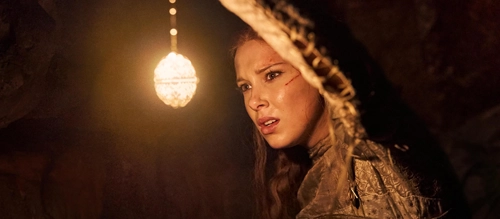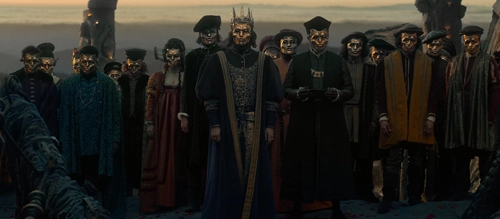
Damsel (2024)
Director: Juan Carlos Fresnadillo
Screenwriter: Dan Mazeau
Starring: Millie Bobby Brown, Ray Winstone, Nick Robinson, Brooke Carter, Shohreh Aghdashloo, Angela Bassett, Robin Wright
For as long as storytelling has existed, damsels have been in distress. The trope can be traced back to ancient history and has continued to evolve and endure well into the modern era, most notably put under the spotlight in 1999 with comic writer Gail Simone’s ‘women in refrigerators,’ which describes the disempowerment and often death of women in order to further the male hero’s journey. Damsels in distress have been the source of some of cinema’s most iconic images, like Fay Wray in King Kong. But, for as long as the trope has existed, filmmakers and television creators have been subverting it too, from Buffy Summers to Princess Leia and Sara Connor. Who could forget Meg’s quip in Disney’s Hercules; “I’m a damsel. I’m in distress. I can handle this.”
Considering all of that, it’s hard to understand why Netflix’s fantasy film, Damsel, starring Millie Bobby Brown, is under the impression that it is somehow groundbreaking, single-handedly saving female protagonists from a lifetime of perpetual victimhood. ‘Heroine saves herself instead’ is not a new concept and Damsel’s air of self-importance hinders it from actually exploring its longstanding themes and characters in new or compelling ways.
After a painfully unaware voiceover by Millie Bobby Brown, who lets us know, with complete seriousness, that she’s ‘not like other girls,’ Damsel introduces us to Elodie, the teenaged daughter of a lord, living in an unnamed kingdom. Elodie receives an offer from Queen Isabelle (Robin Wright) of Aurea to marry her son, Prince Henry (Nick Robinson). Elodie, her father, Lord Bayford (Ray Winstone), her younger sister, Floria (Brooke Carter), and their step-mother, Lady Bayford (Angela Bassett) all travel to this distant, wealthy land where things are not at all what they appear to be. When Elodie and her new husband venture into the mountains for a supposed traditional wedding ceremony, she finally learns the truth: she is not a bride, but a sacrifice for a blood thirsty dragon, who, every generation, takes girls of royal blood in exchange for the prosperity of the kingdom. Flung into the dark caverns of the mountains, Elodie tries to escape and uncover the painful truth behind the Dragon’s bargain.
The biggest problem with Damsel is its script, which is somehow both painfilly heavy handed and frustratingly vague. The world that Elodie and her family inhabit is devoid of life and entirely unpopulated, making it seem like her family and Henry’s family are the only people on the planet. It is a generic fantasy world filled with dragons and kings, and absolutely nothing sets it apart from every other fantasy world we already know. Some of the sweeping shots of the green lands and snow covered hills are pretty, but it doesn’t add any context to the story. Indeed, there is barely an attempt at world building and it’s as if someone plugged the general premise of this movie into ChatGPT and just went with whatever it spit back out. The only thing we learn about Elodie and her people, her community, is that they’re impoverished and on the brink of starvation – we learn nothing about society or the rules of this world. The costuming by Amanda Monk, who recently costumed Dungeons and Dragons, is simply Medieval-looking. The costumes tell us nothing about who the characters are or what their status is. Elodie’s outfits and Queen Isabelle’s outfits are practically indistinguishable, despite Elodie being poor. However, it is pretty cool how Elodie slowly sheds her wedding dress and uses the pieces of that dress and her crown to aid in her escape.

The characters can only be described as thinly drawn outlines instead of flesh and blood. Robinson’s Henry is stiff, awkward and out of place. Emotions barely register on his face. He is so inconsequential to the story that, besides being used a ruse to lure young women to their deaths, he could have been completely written out and it wouldn’t have made much of a difference. Both Robinson and Brown struggle against their instincts to sound too modern in their voice and cadence, and their scenes together feel like two students stumbling their way through a high school production of Shakespeare. Wright and Bassett are both way too good for this movie, but at least their lines don’t sound completely ridiculous and forced. The only standout performance is by Shohreh Aghdashloo’s voice work as the dragon. Her voice is both enthralling and intimidating, and while the CGI work leaves a lot to be desired, the dragon feels far more real than any of the human characters thanks to her thoughtful performance.
Damsel marks Brown’s transition into adult roles following her breakout in 2016 at only 12 years old as Eleven in Netflix’s ‘Stranger Things.’ It’s hard to pinpoint exactly what’s so off about her performance, but much of the disconnect is certainly tied to the fact that it’s impossible to find Elodie on the page. She’s nobody. We learn almost nothing about her and her hopes or dreams, aside from a throw away line about wanting to see the world. Her character seems to change from scene to scene based on what’s required. The first time we seen Elodie, she’s chopping wood, because she’s a strong woman, of course. And, when the marriage is first proposed to her, she says that she can’t marry someone she’s never met. But she does marry him and she is completely unable to see that Henry and his family are suspect, even when her step-mother literally says so. It would work if we cared about their relationship, if we were able to see that she’s in love with Henry, but the movie makes no such attempt.
If the point was to transform Elodie from a docile lamb into survivor, that would be fine. But Elodie is without any interiority to transform from. She has external obstacles, but nothing is happening inside. This makes emotional moments between her and her father feel hollow because there isn’t any conflict to resolve or play with. The filmmakers couldn’t even commit to giving Elodie some skills that would help her escape, aside from hinting at an obsession with mazes that never really factors in. Brown’s performance is actually best when she isn’t talking, when she’s dirty and crying and scared, because at least she has an objective to strive towards.
Damsel is packed with grand monologues about women’s suffering and girl power, but they’re just punchy words without real meaning behind them. And they’re so half baked and broad that it’s difficult to parse what the filmmakers are trying to say – other than, ‘Hey this would be a great gif to share on X.’ Strong women, strong characters, are not made by waxing poetic. They’re made in the fires of their desires and motivations and complex lives. There are some interesting ideas hidden somehow in Damsel, but the filmmakers weren’t interested in really exploring them. It is not enough to ask, what if the prince in this fairy tale is actually bad? Frozen answered that question a decade ago and it’s time we started asking some new ones.
Score: 3/24

